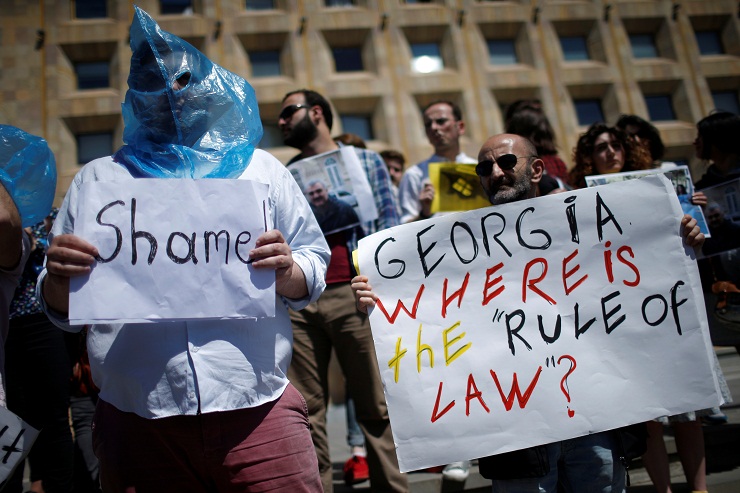The International Press Institute today called on Azerbaijani authorities to release journalist Afgan Mukhtarli, who was apparently kidnapped in neighbouring Georgia on Monday and forcibly returned to Azerbaijan, where he now faces charges of smuggling and illegal border crossing.
Mukhtarli’s lawyer, Elchin Sadigov, told the Associated Press that his client was abducted from his home in the Georgian capital of Tbilisi Monday evening by men Mukhtarli said were wearing Georgian police uniforms. The journalist was then driven through Georgian and Azerbaijani border checkpoints. Sadigov said Mukhtarli was severely beaten by his kidnappers, who proceeded to place 10,000 euros in his pockets, which led to the smuggling charges. Mukhtarli may be held in custody for up to three months, according to reports.
Mukhtarli had been living in exile in Georgia since 2015. Leila Mustafayeva, Mukhtarli’s wife, told AP that at the time of his kidnapping her husband had been investigating Azerbaijani President Ilham Aliyev’s family’s business ties in Georgia.
The cirumstances behind the kidnapping, and how it was able to be carried out on Georgian soil, remain unclear. Georgia’s Interior Ministry said it had launched an investigation into the incident and referred to Mukhtarli’s detention as an act of “unlawful imprisonment.” About 100 activists and journalists rallied in Tbilisi on Wednesday to demand clarity from the Georgian government.
Natia Koberidze, chair of IPI’s Georgian National Committee, strongly criticised Georgian government officials, including Prime Minister Giorgi Kvirikashvili and Interior Minister Vakhtang Gomelauri, for what she said were statements that uncritically parroted the accusations levelled against Mukhtarli by the Azerbaijani authorities.
Those actions, she said, “have revealed the cynicism and indifference of high-ranking Georgian officials. The actions of the Georgian authorities in the case of Afgan Mukhtarli constitute a grave violation of human rights and the fundamental principles of the Georgian state.”
She added: “The president of Georgia, Giorgi Margvelashvili, has called the case a serious challenge to Georgia’s sovereignty that has undermined the reputation of the country as a leader in the region for defending the media and human rights. Georgian journalists, civil society representatives, and ordinary citizens are deeply concerned and intend to continue their protest.”
IPI Director of Press Freedom Programmes Scott Griffen said IPI called for Mukhtarli’s immediate release.
“The extrajudicial kidnapping of Afgan Mukhtarli demonstrates the lengths Azerbaijan is willing to go to silence critical journalists, even those living abroad in exile. It also raises serious questions about Georgia’s commitment to human rights and press freedom as the country seeks a closer relationship with the EU. The Georgian government needs to clarify how this incident occurred and push Azerbaijan to drop its campaign of harassment against the media.”
Azerbaijan’s repression of journalists continues to grow. In 2015, an Azerbaijani court sentenced prominent investigative journalist Khadija Ismayilova, known for her scrutiny of the wealth of the country’s first family, to nine years in prison. Ismayilova was released in 2016 following international pressure. Earlier this year, journalist and blogger Mehman Huseynov was convicted of “defaming” a police station after revealing alleged abuses he suffered at the police’s hands. He was sentenced to two years in prison in March.



